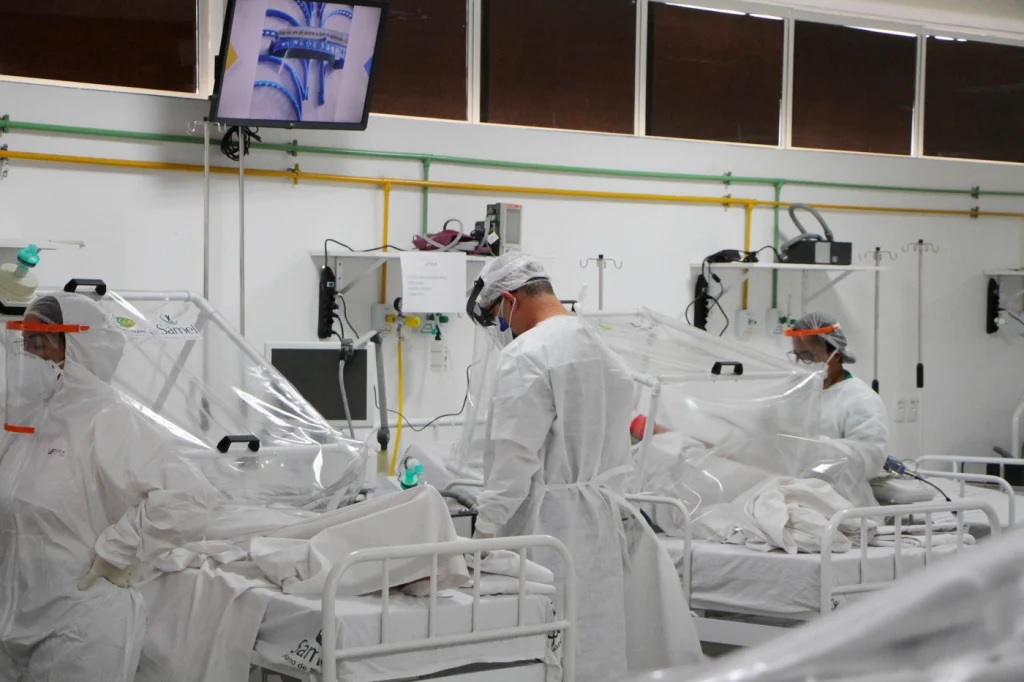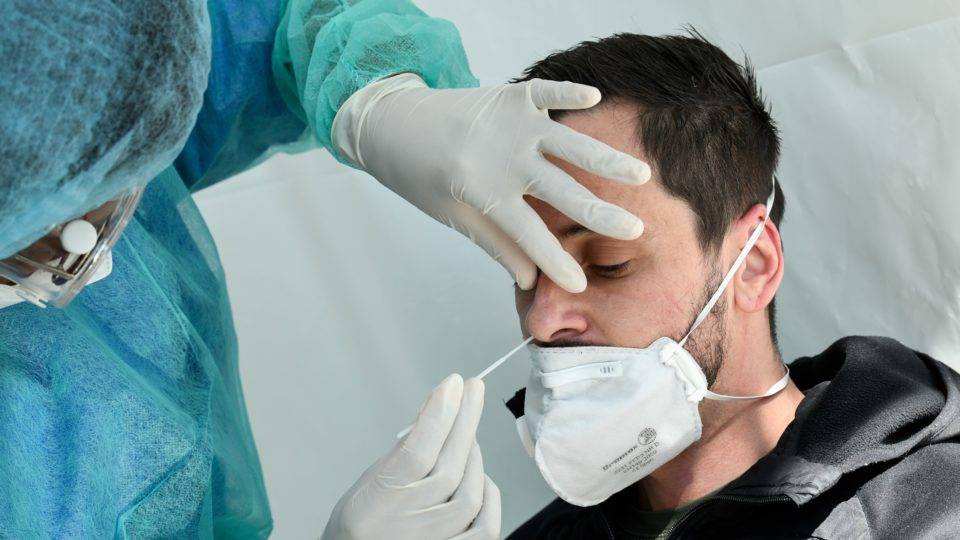RIO DE JANEIRO, BRAZIL – The rise in the number of Covid-19 cases in Rio de Janeiro months after the relaxation of social isolation has been worrying residents of the state and experts.
In the capital, the ICU bed occupancy rate exclusive for patients with the novel coronavirus reached 92% in the SUS network on Sunday, November 22nd, the same rate as in May, the previous critical period. The occupancy rate of ward beds stood at 69%.
According to the Municipal Health Secretariat, the highest ICU bed occupancy rate, to date, occurred on May 4th, at 98%. Ward beds recorded their highest occupancy rate on May 9th, at 95%.
By November 22nd, 21,974 deaths and 338,203 confirmed cases of the disease were recorded in the state. The rolling average of deaths stands at 97, a variation of 153% compared to two weeks ago, and the rolling average of cases is also on the rise, with a variation of 114%.

However, the current scenario is different from that of May. Now there are temporary health units closed, flexibility in the rules of isolation, and relaxation of the wearing of masks in public places. According to experts, these factors must be observed so that new guidelines can be adopted in the treatment of patients.
For Fiocruz (Oswaldo Cruz Foundation) public health researcher Marcelo Gomes, the recent increase in the number of cases can still not be pointed out as a trend. He stresses that the main difference between the current moment and the situation in the city in May, at the start of the Covid-19 pandemic, is the absence of an emergency plan, with field hospitals, social isolation, and a high level of alert from health authorities.
“We have a very different scenario than in May. Then, we had a very important effort, with a much higher percentage of beds exclusive for Covid. Not today. Our reaction time is shorter. It’s a more worrying situation regarding the assistance available,” analyses the researcher.
Reactivation of beds
The number of hospitalizations of patients with Covid-19 has been increasing in SUS public hospitals, which include municipal, state, and federal unit beds located in the city. For infectologist Fernando Chapermann, the increase in cases does not represent a second wave of the disease.
“I find a second wave difficult to occur because for it to happen we would have needed to have controlled, zeroed, the first wave; this was not the case. We are experiencing an increase in cases because people are relaxing, but this increase has not yet been reflected in hospitalizations. And the mortality curve is not at an alarming level,” explained Chapermann.
According to the expert, the field hospitals do not need to be reopened. However, Chapermann reinforces that it would be very important to reactivate the beds standing idle in the hospitals.
“We lost the field hospitals, the Bonsucesso Hospital, and other health facilities over the course of what was planned. So it would be worthwhile reactivating beds and teams that were ready, working in these sites with great demand. For a plan to be properly executed it is necessary to have guidelines to support this health demand,” pointed out the infectologist.
Hospitalizations vs. beds
On June 3rd, the city recorded the highest number of deaths in 24 hours. At the time, the SUS network in the capital had 667 people with Covid hospitalized in ICU – that is, 87% of the total available.
On November 22nd, the SUS network in the capital had 1,044 people hospitalized in specialized beds, 499 of whom in the ICU. Although the number was lower than in June, the occupancy rate was higher, 92%, due to some beds having been closed.
The rate is based on the ratio of the total number of available beds and the number of hospitalized patients. Since June, beds have been closed in field hospitals and the Federal Hospital of Bonsucesso, which caught fire on the past November 27th.
According to the Municipal Health Secretariat (SMS), the City Hall’s Field Hospital in Riocentro, in the West Zone, is still open and could be increased with the opening of new beds.
“The municipality’s health system, therefore, remains on alert and prepared for the handling of Covid-19 cases,” the Secretariat reported.
Given the increase in the number of cases, the State Health Secretariat reported on Wednesday, November 18th, that it opened 83 new beds exclusively for patients with the novel coronavirus. Of this total, 41 beds are located in the capital.
On Tuesday, November 17th, the SMS reinforced its recommendations for the Family Clinics, considering the current phase of the pandemic. Among the recommendations are:
- Reopen spaces dedicated to the care of respiratory conditions;
- Reinforce the number of supplies and personal protection equipment;
- Offer remote assistance to patients who need to stay at home.
For researcher Marcelo Gomes, recent data on bed occupancy and new cases of the disease should light an alert in government officials.
“These reports we have seen and other data that may perhaps point to a trend reversal, yes, they do light an alert. With the flexibilization, people started to have hospital care again for other health reasons. The search for hospital service increased and we also had a decrease in bed availability. All this leads to a worrying scenario,” warned Marcelo Gomes.

Number of positive tests skyrockets
Another important indicator to analyze the current moment of the pandemic in the city is the performance of tests to assess the presence of the virus in the population. And, like the other indicators, the number of Covid-19 tests with positive results for the disease during the month of November merits attention.
The Richet Laboratory alone, which serves the hospitals of the D’or Health Network, has conducted a total of 186,000 tests since March. And in only 18 days in November, the doctors found 5,598 positive results for the disease. With 11 days left to the end of the month, the number of people with Covid-19 in the period is now very close to the results found during the whole month of October and September.
By way of comparison, in the month of May the laboratory registered 6,164 positive cases. The difference is only 566 cases compared to November results.
For Helio Magarinos Torres Filho, medical director of the Richet Laboratory, what is most surprising is the high rate of positivity of tests conducted in November. According to him, 37% of people who seek the laboratory to take the test are diagnosed with the disease.
“In November we saw a growth of around 15% in positivity, compared to October. It still doesn’t reach the peak number of the pandemic, because at the peak of the pandemic we tested only symptomatic patients and now we are testing everyone. We have now reached 37% positivity. And this is a very high figure when you test everyone,” Magarinos explained.
There is a shortage of tests
In some private health units, the lack of kits for testing patients who want to know if they have had contact with the novel coronavirus can be observed. This is the case of the São José Healthcare, a private hospital located in Humaitá, in the South Zone of Rio.
According to patients, last Thursday, November 19th, the hospital was unable to schedule new tests due to a shortage of kits.
In a note, São José Healthcare denied the shortage of Covid-19 tests at the facility. According to them, the hospital has been conducting exams to determine infection with the novel coronavirus, through medical assessment of symptoms and health condition of patients treated in their emergency room.
What those involved say
The State Health Secretariat on Wednesday, November 18th, issued a resolution on the classification of Covid-19 beds in the Metropolitan Region of the State of Rio de Janeiro. The document determines that the beds intended for the treatment of patients with Covid-19, clinical or ICU, that are free, must be classified as blue, that is, ready to be used.
In addition to this measure and the allocation of 83 beds for Covid-19 patients in Rio and neighboring suburb Duque de Caxias, the Secretariat reported on the increase in testing.
“The SES is unifying data on the municipal units able to conduct the tests, in order to have greater control over the offer of rapid tests to the population”.
However, when asked about the possibility of reopening the state’s field hospitals, the Secretariat said that there is no such option. According to them, the state-run field hospitals have already been demobilized.
The Municipal Health Secretariat said that it does not believe in a second wave of coronavirus infection. They reported that 20 new ICU beds were opened at the Ronaldo Gazolla Municipal Hospital, with the goal of supplying the 30 closed beds at the Bonsucesso Federal Hospital.
“The strategy is part of the City Hall’s Contingency Plan to monitor the response to the coronavirus in the city. It is important to recall that the closed field hospitals were not part of Rio’s City Hall. The City Hall’s Field Hospital, in Riocentro, is still open and able to be expanded with the opening of new beds. The city’s health system, therefore, remains vigilant and prepared to deal with cases of covid-19”.
The SMS stressed the recommendations for the population to maintain individual care to prevent the spread of the virus, such as avoiding crowds, wearing masks, and complying with hygiene rules.
Doubled care
Faced with a scenario of uncertainties, with a growing number of cases and fewer available beds, experts continue to state that the most important issue at the moment is to maintain the social distancing rules, whenever possible.
All health authorities reinforced the guidelines for people to wear protective masks when leaving home, as well as to wash their hands well and avoid crowds and closed environments.
“The behavior of the case curve is much more dependent on our behavior. Our behavior is much more relevant at this time. We must not neglect prevention measures. Individual care continues to be essential,” said Fiocruz researcher Marcelo Gomes.
Source: G1

